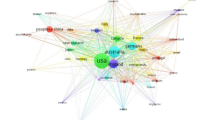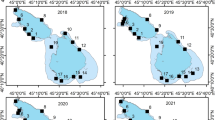Abstract
Three populations of the grazing isopod Idotea balthica were exposed to high CO2 treatment for a period of 20 days to investigate the effect of ocean acidification (OA) on animal health and immunocompetence. The results of the populations from more saline habitats were comparable and showed a 60–80 % decrease in immune response as a result of the high CO2 treatment. Analysis of protein carbonyls showed no treatment effect, indicating that short-term OA does not increase oxidative protein damage. Meanwhile, the third tested population from the lower saline Baltic Sea had higher background protein carbonyl levels. Ocean acidification in addition to this resulted in 100 % mortality. The results of this study show that OA reduced immunocompetence of this marine isopod. In addition, populations and individuals in poor health are potentially at greater risk to succumb under OA.



Similar content being viewed by others
References
Belkin IM (2009) Rapid warming of large marine ecosystems. Prog Oceanogr 81:207–213
Bibby R, Cleall-Harding P, Rundle S, Widdicombe S, Spicer JI (2007) Ocean acidification disrupts induced defences in the intertidal gastropod Littorina littorea. Biol Lett 3:699–701
Bibby R, Widdicombe S, Parry H, Spicer JI, Pipe R (2008) Effect of ocean acidification on the immune response of the blue mussel Mytilus edulis. Aquat Biol 2:67–74
Bradassi F, Cumani F, Bressan G et al (2013) Early reproductive stages in the crustose coralline alga Phymatolithon lenormandii are strongly affected by mild ocean acidification. Mar Biol 160:2261–2269
Bussell JA, Gidman EA, Causton DR et al (2008) Changes in the immune response and metabolic fingerprint of the mussel, Mytilus edulis (Linnaeus) in response to lowered salinity and physical stress. J. Exp Mar Biol Ecol 358:78–85
Caldeira K, Wickett ME (2003) Anthropogenic carbon and ocean pH. Nature 425:365
Dickinson GH, Matoo OB, Tourek RT, Sokolova IM, Beniash E (2013) Environmental salinity modulates the effects of elevated CO2 levels on juvenile hard-shell clams, Mercenaria mercenaria. J Exp Biol 216:2607–2618
Dickson AG (1990) Standard potential of the reaction—AgCl(S) ? 1/2H–2(g) = AG(S) + HCL(aq) and the standard acidity constant of the ion HSO4- in synthetic sea-water from 27315-K to 31815-K. J Chem Thermodyn 22:113–127
Dickson AG, Millero FJ (1987) Comparison of the equilibrium constants for the dissociation of carbonic-acid in seawater media. Deep Sea Res 34:1733–1743
Feely RA, Doney SC, Cooley SR (2009) Ocean acidification: present conditions and future changes in a high-CO2 world Oceanogr 22:36–47
Feistel R, Weinreben S, Wolf H, Seitz S, Spitzer P, Adel B, Nausch G, Schneider B, Wright DG (2010) Density and absolute salinity of the Baltic Sea 2006–2009. Ocean Sci 6:3–24
Findlay HS, Kendall MA, Spicer JI, Turley C, Widdicombe S (2008) Novel microcosm system for investigating the effects of elevated carbon dioxide and temperature on intertidal organisms. Aquat Biol 3:51–62
Havenhand JN, Buttler F-R, Thorndyke MC, Williamson JE (2008) Near-future levels of ocean acidification reduce fertilization success in a sea urchin. Curr Biol 18:R651–R652
Hernroth B, Baden S, Thorndyke M, Dupont S (2011) Immune suppression of the echinoderm Asterias rubens L. following long-term ocean acidification. Aquat Toxicol 103:222–224
Hernroth B, Sköld HN, Wiklander K, Jutfelt F, Baden S (2012) Simulated change causes immune suppression and protein damage in the crustacean Nephrops norvegicus. Fish Shellfish Immunol 33:1095–1101
IPCC (2007) Climate change 2007: synthesis report: summary for policymakers
Jormalainen V, Honkanen T, Mäkinen A, Hemmi A, Vesakoski O (2001) Why does herbivore sex matter? Sexual differences in utilization of Fucus vesiculosus by the isopod Idotea baltica. Oikos 93:77–86
Kurtz J (2002) Phagocytosis by invertebrate hemocytes: causes of individual variation in Panorpa vulgaris scorpionflies. Microsc Res Tech 57:465–468
Leidenberger S (2013) Adaptation to the Baltic Sea—the case of isopod genus Idotea. Doctoral Thesis, University of Gothenburg, Faculty of Science, Department of Biological and Environmental Sciences
Levine RL, Stadtman ER (2001) Oxidative modification of proteins during aging. Exp Gerontol 36:1495–1502
Lewis CN, Brown KA, Edwards LA et al (2013) Sensitivity to ocean acidification parallels natural pCO2 gradients experienced by Arctic copepods under winter sea ice. Proc Natl Acad Sci USA:E4960–E4967
Matozzo V, Chinellato A, Munari M et al (2012) First Evidence of Immunomodulation in Bivalves under Seawater Acidification and Increased Temperature. PLoS ONE 7:e33820
Matozzo V, Chinellato A, Munari M, Bressan M, Marin MG (2013) Can the combination of decreased pH and increased temperature values induce oxidative stress in the clam Chamelea gallina and the mussel Mytilus galloprovincialis? Mar Pollut Bull 72:34–40
Mayor DJ, Everett NR, Cook KB (2012) End of century ocean warming and acidification effects on reproductive success in a temperate marine copepod. J Plankton Res 34:258–262
McNeil BI, Matear RJ (2008) Southern Ocean acidification: a tipping point at 450-ppm atmospheric CO2. Proc Natl Acad Sci USA 105:18860–18864
Mehrbach C, Culberson CH, Hawley JE, Pytkowicz RM (1973) Measurement of the apparent dissociation constants of carbonic acid in seawater at atmospheric pressure. Limnol Oceanogr 18:897–907
Meier HEM (2006) Baltic Sea climate in the late twenty-first century: a dynamical downscaling approach using two global models and two emission scenarios. Clim Dyn 27:39–68
Melatunan S, Calosi P, Rundle SD et al (2013) Effects of ocean acidification and elevated temperature on shell plasticity and its energetic basis in an intertidal gastropod. Mar Ecol Prog Ser 472:155–168
Melzner F, Thomsen J, Koeve W et al (2013) Future ocean acidification will be amplified by hypoxia in coastal habitats. Mar Biol 160:1875–1888
Niiranen S, Yletyinen J, Tomczak MT, Blenckner T, Hjerne O, MacKenzie BR et al (2013) Combined effects of global climate change and regional ecosystem drivers on an exploited marine food web. Glob Chang Biol 19:3327–3342
Nylund GM, Pereyra RT, Wood HL, Johannesson K, Pavia H (2012) Increased resistance towards generalist herbivory in the new range of a habitat-forming seaweed. Ecosphere 3(12):(Article 125)
Pansch C, Nasrolahi A, Appelhans YS et al (2013) Tolerance of juvenile barnacles (Amphibalanus improvisus) to warming and elevated pCO2. J Exp Mar Biol Ecol 160:2023–2035
Pierrot D, Lewis E, Wallace DWR (2006) Co2sys Dos Program Developed for CO2 System Calculations. ORNL/CDIAC-105. Carbon Dioxide Information Analysis Center, Oak Ridge National Laboratory, U.S. Department of Energy, Oak Ridge, Tennessee
Range P, Chicharo MA, Ben-Hamadou R, Pilo D, Matias D et al (2011) Calcification, growth and mortality of juvenile clams Ruditapes decussatus under increased pCO(2) and reduced pH: variable responses to ocean acidification at local scales? J Exp Mar Biol Ecol 396:177–184
Raven J, Caldeira K, Elderfield H, Hoegh-Guldberg O, Liss P, Riebesell U, Shepherd J, Turley C, Watson A (2005) Ocean acidification due to increasing atmospheric carbon dioxide. The Royal Society policy document 12/05. The Clyvedon Press Ltd., Cardiff, UK
Reznick AZ, Packer L (1994) Oxidative damage to proteins. Spectrophotometric method for carbonyl assay. Methods Enzymol 233:357–363
Roth O, Kurtz J (2009) Phagocytosis mediates specificity in the immune defence of an invertebrate, the woodlouse Porcellio scaber (Crustacea: Isopoda). Dev Comp Immunol 33:11151–11155
Roth O, Kurtz J, Reusch TBH (2010) A summer heat wave decreases the immunocompetence of the mesograzer, Idotea baltica. Mar Biol 157:1605–1611
Schiffer M, Harms L, Poertner HO et al (2014) Pre-hatching seawater pCO2 affects development and survival of zoea stages of Arctic spider crab Hyas araneus. Mar Ecol Prog Ser 501:127–139
Schlegel P, Havenhand JN Gillings MR, et al (2012) Individual variability in reproductive success determines winners and losers under ocean acidification: a case study with sea urchins. PLoS One:e53118
Steenbergen JF, Steenbergen SM, Schapiro HC (1978) Effects of temperature on phagocytosis in Homarus americanus. Aquaculture 14:23–30
Styf HK, Skold HN, Eriksson SP (2013) Embryonic response to long-term exposure of the marine crustacean Nephrops norvegicus to ocean acidification and elevated temperature. Ecol Evol 3:5055–5065
Tomanek L, Zuzow MJ, Ivanina AV, Beniash E, Sokolova IM (2011) Proteomic response to elevated PCO2 level in eastern oysters, Crassostrea virginica: evidence for oxidative stress. J Exp Biol 214:1836–1844
Tuomi J, Ilvessalo H, Niemela P, Siren S, Jormalainen V (1989) Within plant variation in phenolic content and toughness of the brown alga Fucus vesiculosus L. Bot Mar 32:505–509
Whiteley NM (2011) Physiological and ecological responses of crustaceans to ocean acidification. Mar Ecol Prog Ser 430:257–271
Wood HL, Spicer JI, Widdicombe S (2008) Ocean acidification may increase calcification rates, but at a cost. Proc R Soc Lond B 275:1767–1773
Wood HL, Nylund G, Eriksson SP (2014) Physiological plasticity is key to the presence of the isopod Idotea baltica (Pallas) in the Baltic Sea. J Sea Res 85:255–262
Wood HL, Sundell K, Sköld HN, Carney Almroth B, Eriksson. Evidence of countergradient variation and adaptive slow intrinsic growth rate in a marine Isopod (Idotea balthica) locally adapted to low salinity (in review)
Wootton EC, Pipe RK (2003) Structural and functional characterisation of the blood cells of the bivalve mollusc, Scrobicularia plana. Fish Shellfish Immunol 15:249–262
Yan B, Dai Q, Liu X, Huang S, Wang Z (1996) Flooding-induced membrane damage, lipid oxidation and activated oxygen generation in corn leaves. Plant Soil 179:261–268
Acknowledgments
The authors wish to thanks Kirsten Seal for her assistance in the laboratory and the two anonymous reviewers whose comments contributed to the improvement of this article. This work was funded though The Centre for Marine Evolutionary Biology (CeMEB), a Linnaeus Centre of Excellence, with additional project funding from the Wåhlström Foundation.
Author information
Authors and Affiliations
Corresponding author
Additional information
Communicated by H. Pörtner.
Rights and permissions
About this article
Cite this article
Wood, H.L., Sköld, H.N. & Eriksson, S.P. Health and population-dependent effects of ocean acidification on the marine isopod Idotea balthica . Mar Biol 161, 2423–2431 (2014). https://doi.org/10.1007/s00227-014-2518-3
Received:
Accepted:
Published:
Issue Date:
DOI: https://doi.org/10.1007/s00227-014-2518-3




